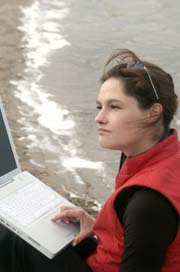Some degrees are very vocational and train you in a particular skill or trade that you need to pursue a particular career. For example, most people graduating from medicine pass into the National Health Service as practicing doctors, and an economist is likely to search for a job in the city as an accountant or financial advisor. But there really is no “typical job” that maths graduates go on to. Mathematics is more of a way of thinking, or a set of tools, than a specific learned skill. However, a mathematician’s logical, problem-solving and numerical skills are highly sought after in many different areas of employment.

Maths jobs from prospects
The Prospects website has a very good area dealing with the skills mathematicians have developed, and the kinds of jobs related to the degree. It offers advice and information on various career paths, as well as employer lists and job vacancies. The site also features case studies and information on graduate destinations and salaries.
Scientific research
 Pharmaceutical companies employ teams of mathematicians to work on clinical data about the effectiveness or dangers of new drugs. Pure scientific research in chemistry and biology also needs mathematicians, particularly those with higher degrees in computer science, to help develop models of complicated processes. Cutting edge industrial design, for example in Formula One race car design or manufacturing product development, also employs a good number of mathematicians, including some with higher degrees.
Pharmaceutical companies employ teams of mathematicians to work on clinical data about the effectiveness or dangers of new drugs. Pure scientific research in chemistry and biology also needs mathematicians, particularly those with higher degrees in computer science, to help develop models of complicated processes. Cutting edge industrial design, for example in Formula One race car design or manufacturing product development, also employs a good number of mathematicians, including some with higher degrees.
Economics
 A lot of the government’s fiscal policy is based on analysis and predictions made by mathematicians. Large companies also employ statisticians to perform market analysis and risk assessment. And so many mathematics PhDs go to work in the City, in financial modelling and stock market trading, that they are colloquially known as “rocket scientists”!
A lot of the government’s fiscal policy is based on analysis and predictions made by mathematicians. Large companies also employ statisticians to perform market analysis and risk assessment. And so many mathematics PhDs go to work in the City, in financial modelling and stock market trading, that they are colloquially known as “rocket scientists”!
What maths does what job?
The American Mathematical Society has put together a list of career profiles explaining exactly what type of maths is used in careers covering everything from toxicology to space science.
Actuarial Services
 An actuary’s job involves studying past trends in order to predict future outcomes, and uses a knowledge of probability and statistics. Traditionally, actuaries have specialised either in the field of pensions, or in life assurance. Recently actuaries have started work in the general insurance industry too. The profession’s motto is “Making financial sense of the future”, and to do this they need not only sophisticated mathematical techniques but also sound business sense and excellent communication skills.
An actuary’s job involves studying past trends in order to predict future outcomes, and uses a knowledge of probability and statistics. Traditionally, actuaries have specialised either in the field of pensions, or in life assurance. Recently actuaries have started work in the general insurance industry too. The profession’s motto is “Making financial sense of the future”, and to do this they need not only sophisticated mathematical techniques but also sound business sense and excellent communication skills.
Teaching
 Mathematicians can find jobs at all levels of the education system. To teach at a secondary school, you will usually need to take the Postgraduate Certificate in Education (PGCE) after doing your degree.
Mathematicians can find jobs at all levels of the education system. To teach at a secondary school, you will usually need to take the Postgraduate Certificate in Education (PGCE) after doing your degree.
Lecturing at university level almost always requires you to be undertaking active research at the institution, and you will need a PhD for that.
There are two work experience schemes for those thinking of going into teaching: the Undergraduate Ambassadors Scheme (UAS) and the Student Associates Scheme (SAS). Even if you end up not becoming a teacher, the skills you can gain in these schemes – communication skills, presentation techniques and team work – are invaluable for other careers too. Standing up in front of 30 kids prepares you for just about anything. To find out more, read our UAS case study.
Find out more about the variety of careers available:
Plus magazine careers library
A collection of interviews from people in various maths-related careers, showing the wide range of uses maths can get put to in the real world.
Many career paths
 These fields are by no means the only routes that can be taken after a degree in maths. In fact, you’d be surprised at the great diversity of jobs that are open to mathematicians; from developing computer games to studying climate change to working with a Formula One racing team on aerodynamics. Plus magazine has an extensive Careers Library, featuring some common as well as some more unusual maths careers. Highlights include a defence analyst, a meteorologist, and even a researcher into the fluid dynamics of food travelling down the intestine!
These fields are by no means the only routes that can be taken after a degree in maths. In fact, you’d be surprised at the great diversity of jobs that are open to mathematicians; from developing computer games to studying climate change to working with a Formula One racing team on aerodynamics. Plus magazine has an extensive Careers Library, featuring some common as well as some more unusual maths careers. Highlights include a defence analyst, a meteorologist, and even a researcher into the fluid dynamics of food travelling down the intestine!
Alternative careers
 If none of the “typical” maths graduate jobs, such as financial consultant, accountant, teacher, appeal to you, then don’t fret. There is an enormous, and very diverse, realm of “alternative” careers. This is not a uniform sector, but has come to include a diversity of jobs slightly different from the majority. These include careers in conservation and the environment, careers in voluntary (not for profit) organisations, and so-called “ethical” careers. Alternative careers tend to involve a different style of work, such as freelance or working from home, or a different type of work, such as corporate fundraising for a charity, or working for an “unconventional” employer, such as performing statistical analyses for Greenpeace. Ethical employers are those that are less profit-motivated, such as charities, rehabilitation centres, environmental or humanitarian organisations like Amnesty International, and so on.
If none of the “typical” maths graduate jobs, such as financial consultant, accountant, teacher, appeal to you, then don’t fret. There is an enormous, and very diverse, realm of “alternative” careers. This is not a uniform sector, but has come to include a diversity of jobs slightly different from the majority. These include careers in conservation and the environment, careers in voluntary (not for profit) organisations, and so-called “ethical” careers. Alternative careers tend to involve a different style of work, such as freelance or working from home, or a different type of work, such as corporate fundraising for a charity, or working for an “unconventional” employer, such as performing statistical analyses for Greenpeace. Ethical employers are those that are less profit-motivated, such as charities, rehabilitation centres, environmental or humanitarian organisations like Amnesty International, and so on.
There are also enormous opportunities for someone that has the logical reasoning and numeracy of a mathematician and also the ability to communicate clearly. You might like to think about a job in science journalism, technical editing, or marketing communications.
Related Links
The Royal Statistical Society’s careers website
You can find links to profiles of people who have statistical jobs.
Maths-jobs.co.uk
This site has a list of currently available jobs. Very useful for getting a feeling for what’s out there.
Courses-Careers
If you are unsure what a particular job, such as investment banking, actually entails, Courses-Careers.com provides excellent descriptions of many different areas of employment.
Careers from the MAA
The Mathematical Association of America provides many profiles of people applying mathematics in both the commercial and academic arenas.
Women into Science, Engineering and Construction Campaign
Women into Science, Engineering and Construction works with industry and education to inspire girls and attract them into Science, Technology, Engineering and Mathematics (STEM) studies and careers.
Operational Research Society careers page
Operational research – helping businesses and organisations to function efficiently – is a major career option for mathematicians. The career page of the OR society tells you how to start and where you can go.






